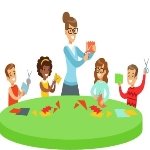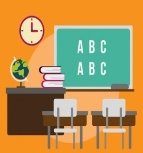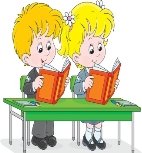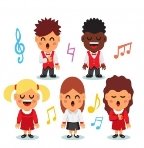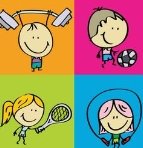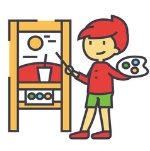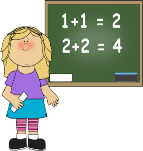Методична розробка уроку "Our favourite lessons"
Form: 3rd
Topic: Our favourite lessons
Learning
objectives: to practice the previous vocabulary and structures (topic “School
life”);
to develop learners’(Ls) reading skills;
to develop Ls’ skills in answering e – mails and writing informal
e – mails (5 – 7 sentences) ;
to revise the rules of writing informal e – mails in English;
to teach Ls to work constructively as a team member;
to build children self – confidence and self – believes.
Recycled
Vocabulary: Lessons(Maths, English, Music, Art, Sport, Handicrafts, Reading, IT,
Ukrainian, Nature Study), Activities (to watch video, to speak and
write, to make things, to learn poems, to read texts, to play games, to
sing songs, to count and do sums, to run and jump, to paint pictures) Recycled
Structure: What is your favourite lesson? Why do you like it? My favourite
lesson is … I like /enjoy doing smth. I like English because …
Learning
outcomes: By the end of the lesson Ls will be able to classify words from
different topics, tell what subjects they like (My favourite lesson is
Maths. Or I like Maths.), give 2 – 3 examples of Ls’ activities at the
different lessons, explain why they like this lesson (I like English
because I enjoy singing songs) and ask other Ls about their favourite
lessons.
By the end of the lesson Ls will be able to identify main idea and find specific information reading small texts (5 – 7 sentences), sequence story (an e – mail) events and recognize the beginning, middle and end of a story.
By the end of the lesson Ls will be able to use the previous vocabulary in writing an e – mail (5 – 7 sentences) and demonstrate their skills in writing informal e – mails using verbal clues.
By the end of the lesson Ls will be able to act different roles in situations, work constructively with other children in group and demonstrate self – confidence in their knowledge.
Materials: PB (Oksana Karpyuk “English 3”, 2017), PB Audio(track U-03– les 5 – p56 – T1, track U-03– les 3 – p53 – T4) , flashcards (names of lessons, days and months), “ Strip story” (HO), “Match the pairs” (HO), badges, a ball, cards for board memory game “Board Pelmanism”, a notebook, magnets, leaves, flowers, cards.
Procedure
Introduction (1 min)
T. Good morning, dear children!
Ls. Good morning, dear teacher!
We wake up in the morning
Ready for the day!
Hello! Hello! Good morning!
What a lovely day!
T. I’m so glad to see you again.
Ls. We are glad to see you too!
Warm up (3 min)
Game “Introduce yourself”
T. Today we are learners from different countries. Learners have got badges with information (name, country). All of the learners stand in a circle. One of them has got a ball and say:
Jump in,
Jump out,
Turn yourself around
And introduce yourself
(Give the ball to other learner and he/she must say):
My name is (Mary)
I am from (Canada).
Chorus: All right! All right! All right!
T. Now, we know each other. Let’s work together.
Presentation (3 min)
T. Open your books on page 56, exercise 1 and listen to the conversation (PB Audio track U-03– les 5 – p56 – T1). https://drive.google.com/file/d/0BwXhjtj9eqT4NjNzOWw2cnBNQ0E/view
Point to the characters and objects you hear about. (Teacher holds up his/her PB and point to the corresponding characters and objects too).
Bill: Hooray! I’ve got a letter!
Kate: A letter? Who is it from?
Bill: It’s from Taras.
Kate: Taras? Who is he?
Bill: He is my friend. He lives in Ukraine.
T. Listen again and tell me what Bill has got, who it is from, who Taras is and where he lives. Let’s guess what this letter is about. (Ls’ ideas). Your ideas are fantastic. Later we’ll see if you are right.
So, at today’s lesson we are going to read the e-mail from Taras and write an answer to his e- mail. Besides, we are going to practice the vocabulary, work in groups and role - play, ask and answer the questions, sing and play games.
Vocabulary Practice (5 min)
T. Let’s make groups for next activity.
Please, choose one of leaves. If you choose yellow one – your group is number 1. Sit here at the desk 1. Red ones – group # 2 and desk 2, green leaves - group # 3 and desk 3.
- “The family of words”
Let’s play “The family of words”. Today our family is “Lessons”. Look at the board! In the word box you see the names of months, lessons and the days of the week. Your task is to find lessons and stick the cards with lessons on the board in their family. Your groups will do it in turn.

Result
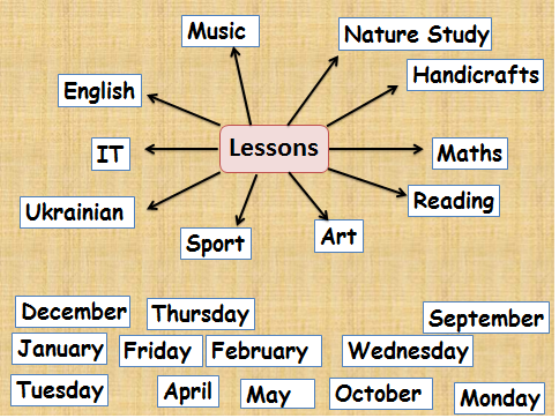
b) Match the pairs.
T. Well done. You are great. You can find all the lessons! Now it’s a new task for your groups on your desks. Match the activities you usually do at these lessons. You can choose some activities for one lesson and some lessons to one activity.
For example: Sport – run and jump, play games
Sport, English, IT – play games
TASK1 HO1
|
Lessons |
Activities |
|
|
|
|
|
|
|
|
|
|
|
|
|
|
|
|
|
|
|
|
CARD FOR LEARNERS HO2
|
Lessons |
Activities |
|
|
|
|
|
|
|
|
|
|
|
|
|
|
|
|
|
|
|
|
T. Your time is over. Look at your cards and say what we usually do at different lessons.
G(Group)1. We sing songs at our Music lessons.
G2. We paint pictures at our Art lessons.
G3, G1, etc.
Oral practice (4 min)
Interview
T. Well done. Now let’s interview each other asking two questions:
What’s your favourite lesson?
Why do you like it?
For example: - What’s your favourite lesson?
- My favourite lesson is English.
- Why do you like it?
- Because I like/enjoy singing English songs and watching
video.
T. (regroups learners) But at first let’s divide into new groups. Take a card. If you have a blue card you are reporters, if you have a green one you give an interview. OK, we have two groups. I am sure you see a number on your card. Find the same number in other group and you find your partner. Great, you did it. Now, partner check. Brilliant! Let’s start our great interview.
T. I think you know each other better now. What is Otto’s favourite lesson, Stella? Why does Otto like it? Bravo, you are real reporters.
Physical activity (1 min)
T. Young reporters, it’s time to relax.
Hands on stomach!
Hands on chest!
Are you tired? Let’s rest!
1, 2, 3 on the tip toes,
1, 2, 3 on the tip toes!
1, 2, 3 turn around.
Clap, clap, step aside
Hands up! Clap, clap, clap.
Hands down! Shake, shake, shake.
Hands on hips! Hop, hop, hop.
Stop, stop, stop!
Reading (exercise 2-3 page 56-57)
- Pre – Reading Activity (5 min)
a) T. Regroup, please. Choose one magnet from the box. Red and green go to the desk with red and green flowers. Blue and yellow go to the desk with blue and yellow flowers. Pink and orange, your desk with pink and orange flowers, of course. Let’s sing the song (exercise 4 page 53 PB and PB Audio track U-03– les 3 – p53 – T4) and fill in the chart “Days and lessons”. https://drive.google.com/file/d/0BwXhjtj9eqT4Y25vcE04eF9vQ28/view
or
https://drive.google.com/file/d/0B0XnOMNiJ4qZcUxVMWdRLTJNb3M/viewT4.
What day is it? It’s Monday.
It is a happy day –
We’ve got some Maths and do some Sport.
Hip – hop, hooray – hooray!
What day is it? It’s Tuesday.
It is a happy day –
We’ve got the English lesson.
Hip – hop, hooray – hooray!
What day is it? It’s Wednesday.
It is a happy day –
We’ve got some Art and Music.
Hip – hop, hooray – hooray!
What day is it? It’s Thursday.
It is a happy day –
We write and read, then jump and say:
Hip – hop, hooray – hooray!
What day is it? It’s Friday.
It is a happy day –
We do some work and make some things.
Hip – hop, hooray – hooray!
We go to school on weekdays.
We’ve got school every day.
But Saturday and Sunday
Are surely for play!
T. Super stars! Now, it’s time to work with the chart. (Chart and cards with lessons & days on the board). Match the day of the weeks and the lesson(s), choose the cards and stick them on the board.
|
Days of the week |
Lessons |
|
Monday |
…. |
|
Tuesday |
English |
|
Wednesday |
…. |
|
Thursday |
…. |
|
Friday |
…. |
Result
|
Days of the week |
Lessons |
|
Monday |
Sport, Maths |
|
Tuesday |
English |
|
Wednesday |
Art, Music |
|
Thursday |
Reading, Sport, Ukrainian/ English |
|
Friday |
Handicrafts |
b) T. Look at the pictures on page 57 PB and say what the boy usually do every day.
Ls: The boy goes to school.
He plays computer games.
He plays football.
He plays the guitar.
- While – Reading Activity (5 min)
a) T. Look through the text of exercise 2 p.56 and say what it is.
Hello Bill,
How are you? My favourite days are Tuesday and Friday. We have got English on these days. English is my favourite lesson. We speak, read and write English. We like singing English songs and playing games, too. What lessons do you like?
Bye,
Taras
Ls. E-mail.
T. Excellent. Who is writing the e – mail and who receives it? What is the letter about?
Ls: Taras is writing the e – mail.
Bill receives the e – mail.
b) T. Read the sentences of exercise 3 on page 57 PB and find key words in every sentence.
For example: His favourite days are Tuesday and Wednesday.
c) T. Read the e – mail again and find true sentences of exercise 3 on page 57 PB, name them.
- Taras lives in England.
- Taras is Bill’s pen – friend.
- He goes to school.
- His favourite days are Tuesday and Wednesday.
- His favourite lesson is English.
- He doesn’t like playing games.
- They do sums at English lessons.
- Taras likes singing English songs.
Ls: True – 2, 3, 5, 8
- Post – Reading Activity (10 min)
a) T. Answer the questions to the text.
- What are the boy’s favourite days?
- What lesson has Taras got on these days?
- What is his favourite lesson?
- What do they do at English lessons?
- What do they like doing at the English lesson?
Ls: 1.Tuesday and Friday
2. English
3. English
4. Speak, read and write English
5. Singing English songs and playing games
b) T. Super job! I have an interesting work for you. Do you want to be real detectives? You have strip stories on your desks. You have to put the strips (sentences) in the correct order (find the beginning, the middle and the end of the text) to make up an e – mail. If you do it correctly you are brilliant detectives in our school.
Hi Mary,
Thank you for your letter. My favourite lesson is Sport. We have got Sport on Monday, Wednesday and Friday. We run and jump at Sport lessons. We also like playing football and basketball. My friends and I like playing football at the weekends too.
What do you like doing at the weekends?
Bye,
Ben
Strip – story HO 3
|
What do you like doing at the weekends? |
|
We run and jump at Sport lessons. |
|
Hi Mary, |
|
My favourite lesson is Sport. |
|
Bye, |
|
We also like playing football and basketball. |
|
We have got Sport on Monday, Wednesday and Friday. |
|
Ben |
|
Thank you for your letter. |
|
My friends and I like playing football at the weekends too. |
c) Writing
T. Bravo! Your groups are incredible! You know a lot about e-mails. Next task for you is to help Bill to write his answer to his friend’s e-mail (exercise 4 on page 57 PB).
T. What does Taras ask Bill in his letter?
Ls. What lessons do you like?
T. Great! Let’s start writing. (Ls write in their copybooks and on the board)
Hi …,
Thank you for your letter. My favourite lesson is …
… … … … …
Bye,
…
Ending (3 min)
- Board memory game “Board Pelmanism”.
T. Well done! You are fantastic today. Let’s play our favourite game “Board Pelmanism”.
Rules: All the pictures and all the words on their cards are in their cells, but they are face down. Turn over any two cards. If the two cards match, keep them. If they don't match, turn them back over. Remember what was on each card and where it was. Watch and remember during the other player's turn. The game is over when all the cards have been matched. The player with the most matches wins.
|
|
Art |
Handicrafts |
|
|
Sport |
|
Maths |
|
|
IT |
|
|
English |
|
|
Reading |
|
Music |
T: Good job! I knew you could do it – I’m proud of you!
- Hometask
Write your answer to Taras’ e-mail.

про публікацію авторської розробки
Додати розробку

